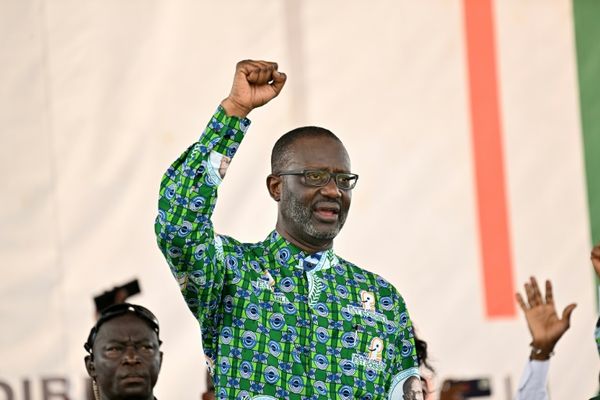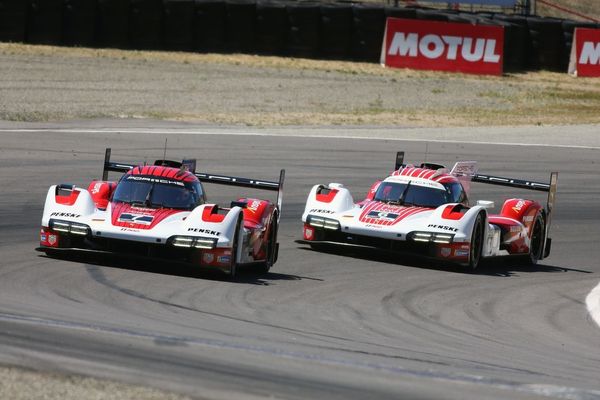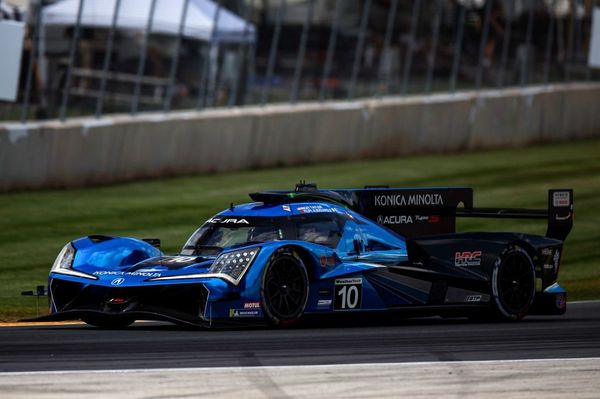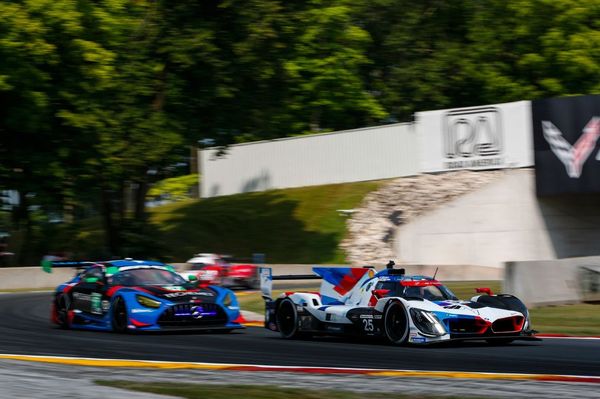
What went so right for Porsche Penske Motorsport’s 963?
It was at this time last year that everything seemed to click for the new-for-2023 prototype, after stumbling out of the blocks despite the longest pre-season testing program (which started in the summer of 2022) compared its IMSA SportsCar Championship rivals Acura, BMW and Cadillac.
Although it bagged a front-row starting spot in that year’s Daytona 24 Hours, gearbox failure took out one car and the other finished 14th after hitting trouble with the then brand-new common hybrid system. There certainly were some glum faces around its garage that day.
It showed at Sebring that, when the night air cooled temperatures, the 963 could find its performance window. But a late-race clash with Acura took out both of its cars, and podium finishes went begging.
Its No. 6 car, driven by Nick Tandy and Mathieu Jaminet, notched an unexpected first win on the streets of Long Beach, after a bold gamble to run on a single set of Michelins paid off. But the fact it could do this showed it wasn’t really working its tires efficiently, and had very poor pace, so this was a Hail Mary effort that luckily paid off.
Chances at Laguna Seca and Watkins Glen went begging – a front row lock-out squandered and an on-the-road victory ruled out for excessive plank wear on the No. 6 car respectively. After an abject showing at Mosport, where only BMW was slower in qualifying, then came Road America…

“For sure, Road America in 2023 was the turning point, where things really started to click,” says ex-F1 racer Felipe Nasr, who leads this year’s championship. “It was truly a weekend that we could unlock the performance of the car, the true speed of the car.”
Back then Nasr shared the No. 7 with Matt Campbell, who since swapped seats with Dane Cameron to race in the World Endurance Championship for 2024.
“That win was really the breakthrough of the 7 crew,” Nasr adds. “If you look at all the results since, I really think the 7 car has been on a high, really ticking the boxes and being consistent.”
Porsche’s director of LMDh factory racing, Urs Kuratle, refers to it as a “very honest victory” that truly kickstarted its successful sequence of races in America.

“It’s like we had a backpack on us that was filled with reliability (issues) and also with performance and operational topics as well,” admits Kuratle.
Following the win, he recalls: “I remember one guy talked to me, ‘So now we can start racing!’ I’m not saying we haven’t had any problems ever since… but maybe that’s the best expression I could say: It’s like the backpack was gone.
“But we are never leaning back, we have to keep on pushing on the whole thing.”
Motorsport.com asked Kuratle what exactly are the key factors that have made the 963 the pack leader: “I think the key strength is that we have a very, very solid package that starts obviously with the drivers,” he replies.
“Road Atlanta is the only race since Road America last year where we have not been on the podium with at least one car. And that is only possible if you have a very strong driver lineup, if the car is reliable and the team doesn't make any mistakes. These are the key factors.
“I think compared to all the competitors, we have the strongest package on that one and that's something we are still not 100% happy – if you ever can be happy about this – we still work on every detail to be, to become better on all those topics.”

This year, the No. 7 car has won the Daytona 24 Hours and The Six Hours at The Glen, while the sister car prevailed at Laguna Seca.
Cameron and Nasr go into this year’s Road America race with a 93-point lead over Cadillac Racing’s Sebastian Bourdais and Renger van der Zande, and are 132 clear of Tandy/Jaminet (who’ve trailed since a disastrous Sebring).
Nasr points to their most-recent victory at Watkins Glen, a race impacted by heavy rainstorms, as the best indicator yet of this team’s precision under pressure.
“When I look at Watkins Glen, I think it was really a test of all of those elements,” Nasr said. “It was a super-hard race with extremely difficult conditions where we had really 50/50 of both.
“It was wet or it was dry, which tires to take, which time to come in the pits. I think that was a really good test to see how we operated in that race, and having the win in Watkins was what’s really not only incredible but was very important for the state of the championship.”
What does a rival think?
Early last year, if you asked one of Porsche’s rival drivers for their thoughts on how the 963 appeared to them in combat, you’d get some puckered lips and responses like “very snappy, very oversteery” and “it seems to struggle to find the performance window on these tires”.
It’s one area that the 963 has vastly improved over its competition lifespan, as it has now won races using all of Michelin’s range of tire compounds – soft, medium and hard – which are mandated for each round.

Speaking on the subject this week, Acura’s Filipe Albuquerque has advocated Michelin leaning more on the use of its soft compound where possible, to try and avoid instances of these heavy yet powerful cars crashing on cold rubber.
“I believe it’s better to blister a tire than to crash a car on the out lap,” he says. “The performance is better with the harder compound wherever you go (in helping stint lengths), but what it is harder is just the survival on cold tyres.
“Having a softer compound, it's just much easier to apply the energy on the out lap, but eventually you will pay through the long run. But, at the end of the day, it's going to be the same for everybody.
“For example, at Long Beach we had the soft when last year it was medium. So that was the main change from last year to this year. On top of that, obviously, all the drivers know and then taking their adjustments, but it seems like Porsche has been a little bit ahead of things on cold tyres.
“They've been a little bit stronger than the others as well in WEC. I mean, I think that's the perks of having cars in multiple championships.”

When Nasr is asked about the tire warmup issue, he says it’s been a real focus of attention.
“I feel like one year under our belts make a huge difference on understanding on how to turn on the tires, depending on each track and the tire compound as well,” says Nasr. “We've seen that several times and in the last race in Watkins, when it was mixed conditions.
“Some cars could really light up the tire right away. Some took maybe a few more laps and, you know, it goes in favor of some cars depending on the track layout and how we put the energy on the tires.
“It's certainly one area we've been working a lot. Not only as a team but as drivers as well trying to see where we can produce and put more energy in the tire, but with the car as well, like setup-wise, things that we can do to generate more heat in the tire.
“Everything counts, you know, in-laps, the out-laps and how you generate the heat on the tires in the race.”

So, while Porsche was already decent on these tire compounds, it was still prone to struggles at high-energy tracks like Mosport (which is no longer on the GTP schedule) and Road Atlanta, which hosts the Petit Le Mans finale.
Porsche’s 963 has certainly hit its sweet spot to lead the IMSA drivers’, teams’ and constructors’ standings with just three rounds to go. And PPM is leading the WEC drivers’ and constructors’ championships too, with customer JOTA topping the teams’…










